Flume: "I’ve seen some of my favourite electronic acts try to do a show with live bass and drums and it sucks"
After ten years of stardom, Flume’s Harley Streten ditched LA to return to his native Australia. Danny Turner discovers why
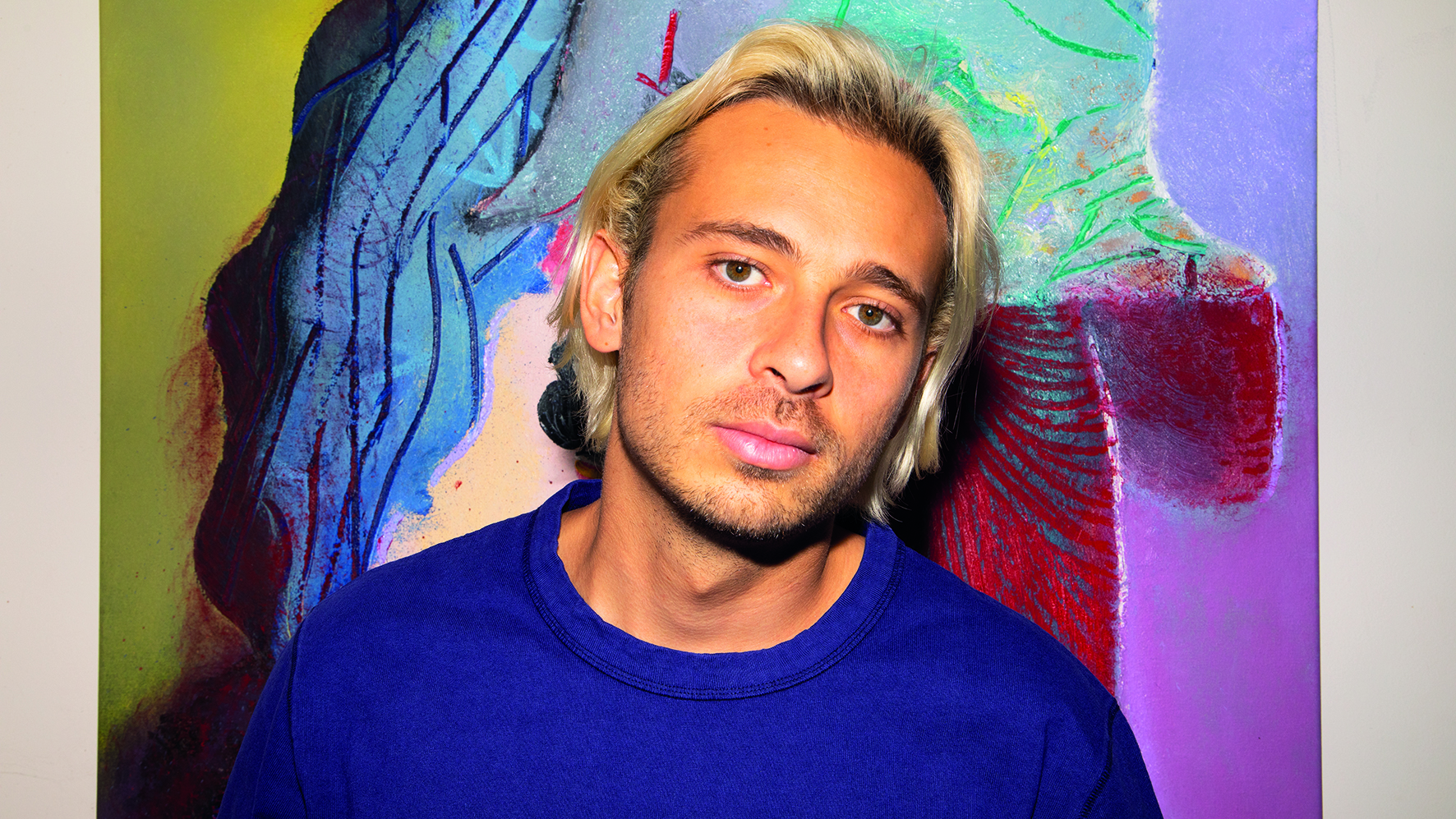
After hitting the big time with pioneering future bass albums such as the self-titled Flume (2012) and Skin (2016), double-platinum selling producer Harley Streten established himself as one of the most successful and celebrated artists in electronic music. However, after a decade at the top, the excesses of fame and non-stop touring left him feeling depressed, lonely and craving normality.
When the pandemic struck, Streten was forced to recalibrate – what had become a social and economic nightmare for most was the 30-year-old producer’s saviour. Relocating from Los Angeles to the Northern Rivers of New South Wales allowed him the time and space to heal. Stripped of his neuroticism and heavily influenced by his new rural surroundings, Streten’s third Flume album, Palaces, is his most honest and inspired to date.
Having moved back to Australia during the pandemic, what provided the impetus for your third Flume album?
“I already had a collection of ideas that started from my studio in LA and travels on tour, but when I got back to Australia I didn’t really know what direction to go in. What I did have is the space, time and clarity to lock in and finish off all of those ideas, and that’s when it all came together.
For me, and probably a lot of other producers, there’s a constant anxiety about becoming irrelevant
“I’d been touring for almost ten years pretty much non-stop with a bit of time off here and there, but it was a crazy whirlwind. From 20, my life kind of went nuts, but Covid put a halt to everything. I needed to slow down and the pandemic gave me that opportunity. For the first time in my adult life I suddenly felt inspired by living life like a normal human being.”
What did that entail?
“Having a nice routine, being able to go surfing or waking up and going down to the local coffee shop and feeling a sense of community was a complete change of lifestyle from what I was used to. I also live in the countryside, so there’s a lot of amazing wildlife here. That’s why I called the album Palaces, because this space felt like my palace – it gave me room to just stop and think and that’s when the ideas started to flow.”
Want all the hottest music and gear news, reviews, deals, features and more, direct to your inbox? Sign up here.
Has the experience made you think differently about your work/life balance, particularly in terms of touring?
“Because I didn’t know how long this career was going to last or whether I’d be a flash in the pan, I wanted to take every opportunity that I could and would just say yes to everything. Now, I’m finally saying no to a bunch of stuff and prioritising my mental health by doing month-long tours rather than three-month tours.
“It’s easy to get swept up in stuff when you have a cool job like this, but for me, and probably a lot of other producers, there’s a constant anxiety about becoming irrelevant. You’re essentially surrounded by a team of people that make money off you, so everyone’s encouraging you to work and you want to do that too, but sometimes you need to stop and think, ‘What do I need?’. Sometimes stopping makes you more productive.”
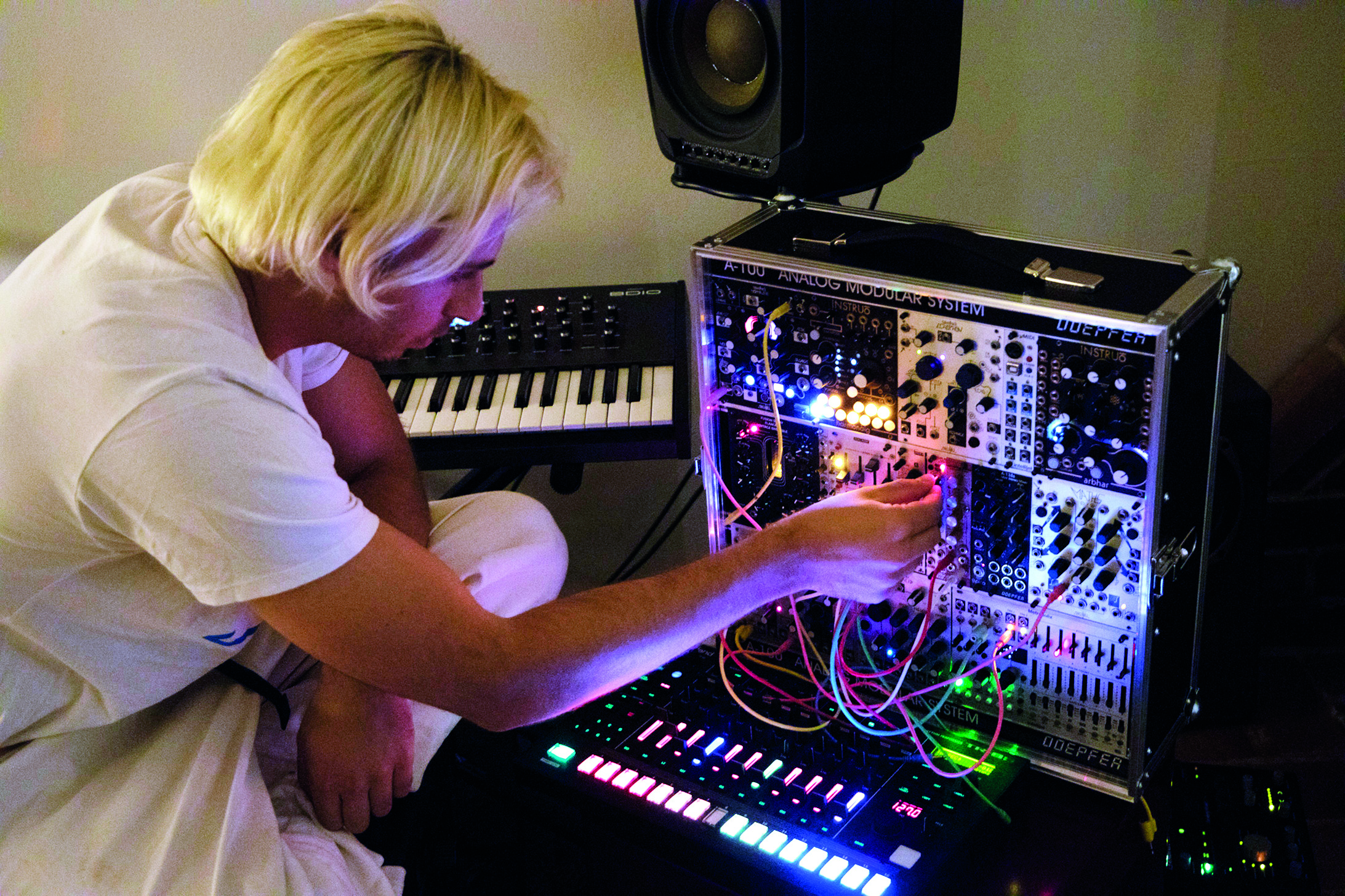
You mention being surrounded by wildlife and the title track appears to feature some of those sounds. Were they based on field recordings?
“I did a lot of field recordings around the property whenever there was a storm. Australia has insane wildlife – you’ll just be hanging out at home and suddenly hear this ‘what the fuck’ sound, which is typically a bird that’s flown in from Peru to mate for two weeks, so I tried to capture those moments.
The most important thing in music is to try to move the culture forward and try something new
“A lot of my music can be quite cold and abrasive at times, but incorporating these Foley found sounds not only created a world but gave warmth to these super-clean and aggressive sounds. There’s also a moment on the song Get You that’s a recording of my friends and me in a car and I think it’s nice to incorporate these human experiences into the music. Not being a narrative-based singer/songwriter where everything is out there in the open, it’s good to add moments that make the music sound more alive.”
In your approach to bass music you’ve often been regarded as a visionary. Did you set out to push the boundaries of how the genre is interpreted?
“My favourite music does that so I’m always trying to innovate or do something that sounds fresh. There’s so much music that sounds the same and I often think where the fun in that is. For me, the most important thing in music is to try to move the culture forward and try something new, and that’s probably my favourite thing about being a producer.”
Once you have a reputation for being somewhat innovative do you then feel pressured to live up to it?
“I’ve always had that mentality of trying to constantly make music that’s super-unique, but as I get older I feel less pressured to do that and I’m starting to get more interested in focusing on songwriting. I’m even thinking about doing some singing.
I’m not a great singer, but Auto-Tune exists and can make anyone sound good [laughs]
“I’m not a great singer, but Auto-Tune exists and can make anyone sound good [laughs]. I’ve always been very production-focused, so I’d like to try and push myself into an area that I haven’t been in before, so singing or maybe playing my saxophone are ideas I’ve been looking into.”
The saxophone is a very ’80s pop instrument…
“It’s all been done before, so if I do try to incorporate sax I’ll look to play it differently or use certain processing so that the instrument’s not used in the traditional sense. Saxophone used to seem boring to me but because I’m not confident at playing it, it would be good to push myself in that direction alongside the sound design.”
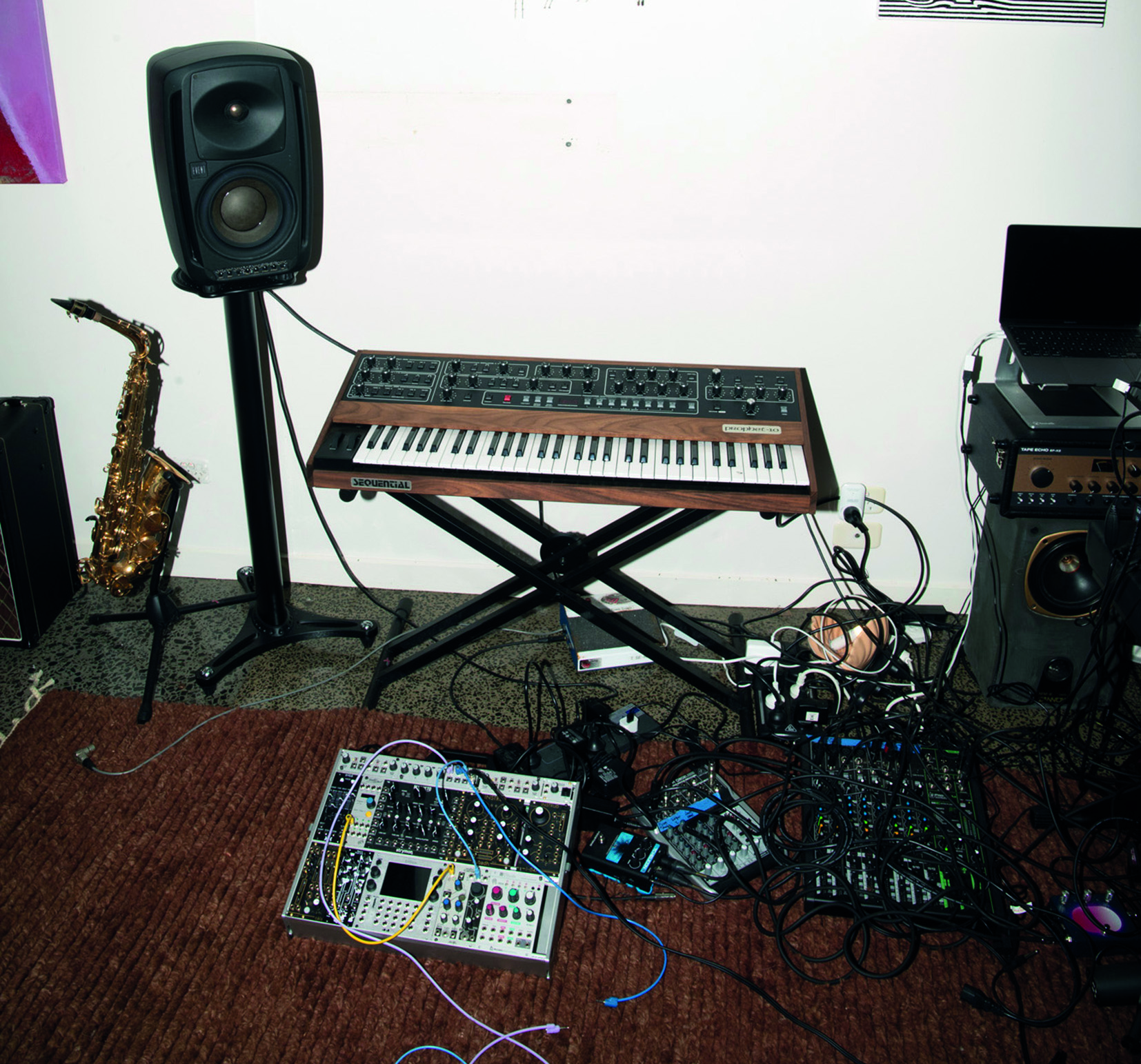
You once said you wanted to make perfect algorithmic music. Did you ever follow up on that experiment?
“I didn’t but it’s still something that’s been bubbling away in my mind. Basically, everyone in the industry seems obsessed with algorithms and I’m kind of sick of it. It annoys me that there’s this constant pressure to put music out that has a certain song length, time or structure that works for radio because it’s what the algorithm likes.
“It’s become a science, but I don’t think it’s ever been so refined. I think it would be fun to find out the top 200 lyrics, the key of a song or the tempo that has the most success with an algorithm and make an EP within these confines that only has those elements and fill it with amazing melodies and interesting sound design. It’s a cynical way to write music, but it’s definitely on my to-do list.”
With Palaces do you think you have begun that process of stripping out the technicalities of your production aesthetic to allow the songs to shine through?
“I’m not going to name names, but I hear a lot of artists going too far in either direction, for example, just an acoustic guitar and a vocal with barely any reverb or people who go nuts with effects and make the production so complicated that the song sucks. I’d also fallen into the trap of relying on effects and technique and I’m wary of that but, ultimately, a good song is a good song and the best music balances those two things.
I’m not trying to reinvent the wheel or change the world; I’m just trying to hit that sweet spot
“With Palaces, I wanted to combine granular sounds with more pop vocal stuff and see if it can all mesh together, and there are also some nice instrumental moments. I’m not trying to reinvent the wheel or change the world; I’m just trying to hit that sweet spot, especially with vocals.”
Caroline Polachek’s soprano vocal on the track Sirens certainly adds a new dimension to your sound…
“She’s incredible. People like her are the reason why I do so many collaborations because she has an amazing vocal that sounds like nobody else. It adds so much to the music that it’s hard to justify not collaborating, but because I’ve collaborated so much on previous albums I want to do less of that and make the next record more quickly.
“I want to write the songs myself next time too, if only to push myself into doing something different, but I’d also like to work with a few rap vocalists because that allows me to flex my muscles in terms of making weird, technical sound design stuff.”
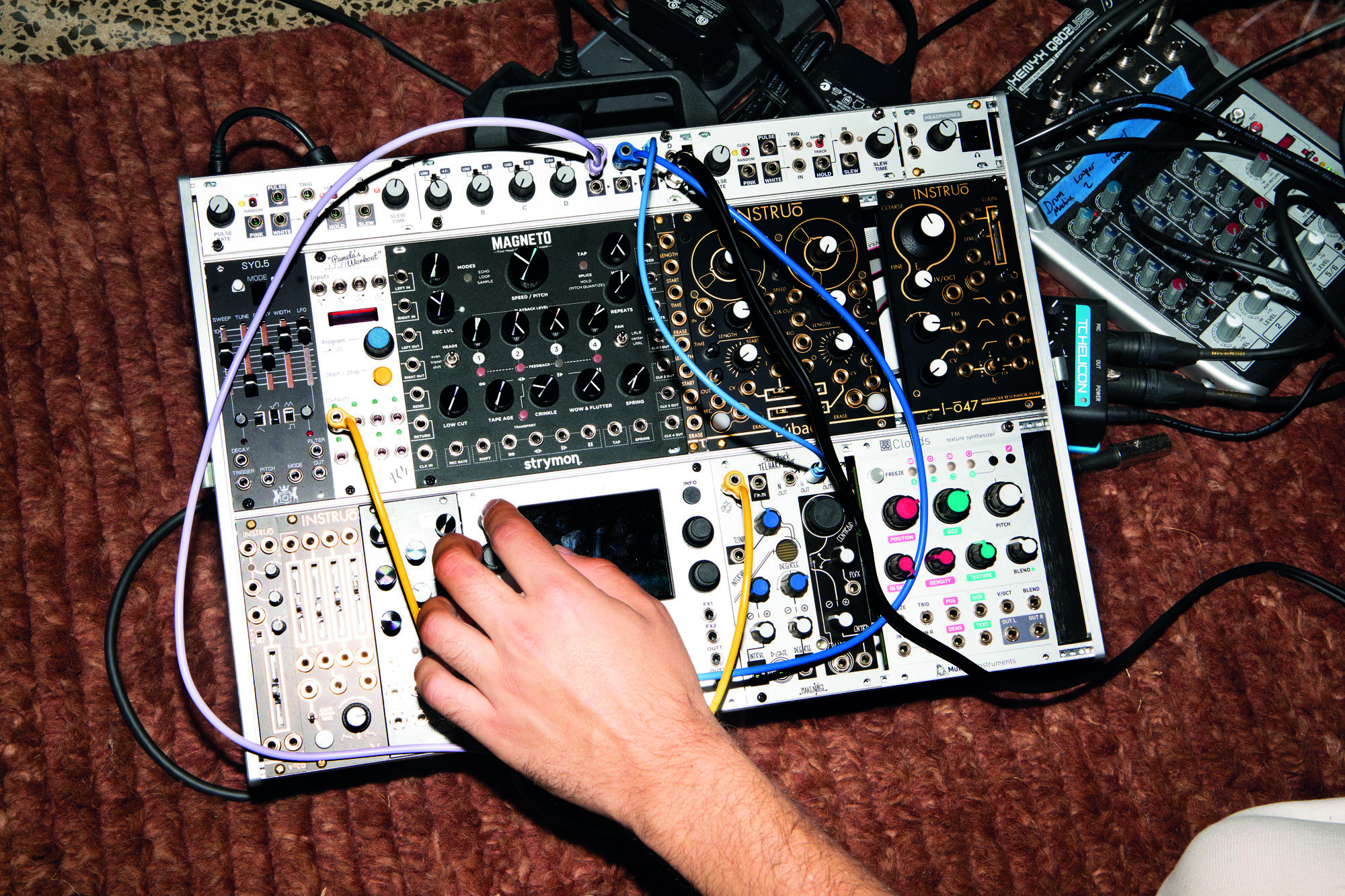
Obviously, the collaboration with Damon Albarn stands out because of who he is. How did that come about?
“When people used to ask me who I would collaborate with if I could choose one person, I’d always say Damon Albarn because Blur and Gorillaz had a huge influence on me. I did a festival in Vegas and happened to play with Damon and we decided to go to this weird dark studio in an abandoned car park that smelt of old weed. We were both hungover and I was incredibly nervous, but I played him a bunch of ideas.”
How did that go?
“He didn’t like anything I was playing [laughs], but eventually after playing about 25 clips he seemed to really like the second to last one. We just sat together, wrote some lyrics and chords and he did the vocal there and then. Then the track sat on my hard drive for about six months before I pulled it up and decided to finish it.”
You used to have a mostly laptop-based setup. Has that been expanded now that you have the money to do so?
“I never had money for hardware so I’d use cracked plugins until I could afford to buy them. Now I’ve got a nice mix of hardware and software and have especially embraced the modular synth stuff. I did an interview for you guys around eight years ago when I’d just got my first proper studio, but it had no gear in it. I’ve always regretted not waiting because now I’ve got loads of fun gear.”
Has hardware changed the tone of your sound or how you approach production?
“The resonance on an analogue filter is something I never had an opportunity to mess with, but it’s hard to say. I’m sure it’s had an influence on the sound, but because I didn’t grow up with hardware I never run MIDI through it.
My favourite synths of all time are probably the Sequential Prophet-10 and the Prophet X
“I just record myself playing stuff for 20 or 30 minutes, sample it and treat the sound like a sample that I got from Splice. What’s good about using hardware is that I’ll come up with stuff I’d never have thought about from being in the box, and I love having the ability to smash hardware.”
What hardware are you using these days?
“When I went to LA in 2016 I bought a house and built a studio but now I have a studio at home in Australia, so it’s a luxury to have these dual setups going. In terms of modular gear, I really like the Make Noise Morphagene module and the Instruo Arbhar Granular Audio Processor, but my favourite synths of all time are probably the Sequential Prophet-10 and the Prophet X, which is like a ROMpler with lots of real sounds.
“The Roland TR-8S is fun to jam on and I’ve got a bunch of loop pedals but I recently got this tiny little Nanobox Lemondrop synth that fits in the palm of your hand.”
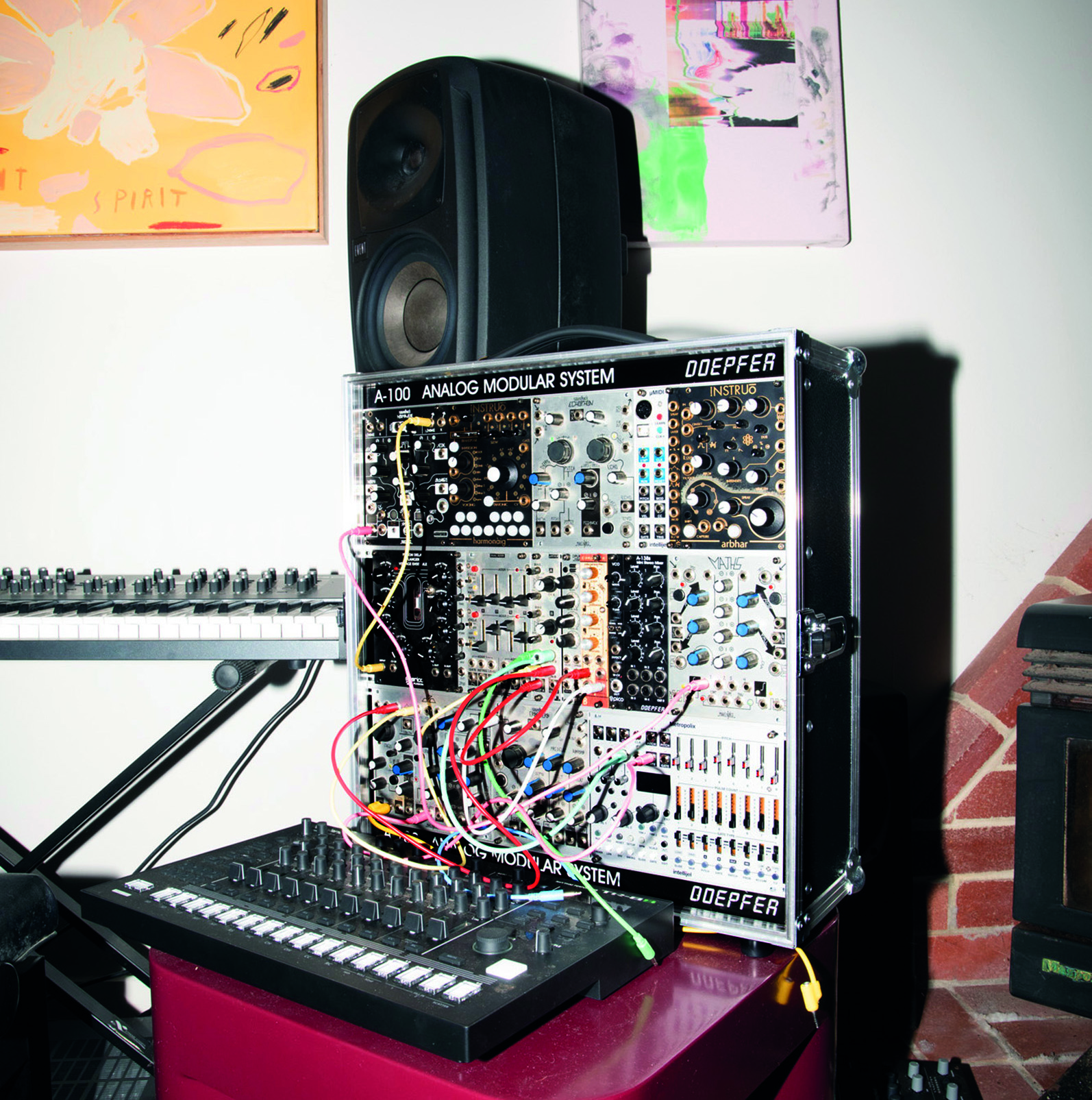
Is that quite a new device?
“It’s sold out everywhere, but I found one on eBay and had to pay extra for it because it’s a really cool little toy. It’s got one oscillator and two channels of granular synth. It’s simple and easy to use and I love the touchscreen interface. It’s got an arpeggiator and mini-jacks so you can connect it to modular gear but the resistance is beautiful and it’s an unusual way of making sounds. I was making a bunch of stuff on it on the plane to the US last week but haven’t used it on a track yet – I’m actually excited to crack it out later today and make something with it.”
Your beats are highly irregular. What’s your approach to beat making?
“I grew up listening to house music and I think the 4/4 kick drum is the best rhythm there is, so once or twice a year I’ll make a house track, but I just get bored of making things in the same tempo.
I’ve always felt like a bit of a phoney playing electronic music live because it’s never going to be entirely live
“One of the major parts of being a producer is getting to decide the rhythm, but when it’s pre-decided for you it takes so much of the fun away from the process, so I’m always trying to find ways to experiment, come up with new rhythms and play with different bpms. When you listen to J Dilla and Flying Lotus you hear the magic of how they design beats that are not on the grid, so adding some random chaos in there definitely helps make things sound less machine-like.”
Do your beats make it difficult to create a linear-sounding live show?
“It’s a nightmare to put a live show together. My first record was 96bpm and the next was full of 140-150bpm half-time stuff, so now I’m finding myself trying to make music that’s in those missing bpm ranges so that when I do a show I can get from song to song.”
You’ve made it known that it’s boring watching electronic artists standing over their gear on-stage, so what’s your approach to playing live these days?
“To have a fuck ton of production and lots of lights [laughs]. I’ve always felt like a bit of a phoney playing electronic music live because it’s never going to be entirely live because you’d need 20 people up there playing different bits. Because of that, we’ve put together a beautiful show that’s had a lot of effort gone into it.”
Is it difficult to adapt electronic music to the live stage?
“When music’s made on a computer if you try to reverse engineer it you’re just going to get a shittier version. I’ve seen some of my favourite electronic acts try to do a show with live bass and drums and it fucking sucks. On my mixtape tour I tried to escape that.
“I thought, if I’m not playing everything live then why play anything live? So I’d run around the stage breaking stuff and angle grinding things. I feel a bit stupid doing that now, so I’ve gone back to at least playing the parts I can and the visuals are amazing because it’s boring just watching someone standing there, but I think people get that.”
Flume's third album, Palaces, is out now on Transgressive/Future Classics.


Future Music is the number one magazine for today's producers. Packed with technique and technology we'll help you make great new music. All-access artist interviews, in-depth gear reviews, essential production tutorials and much more. Every marvellous monthly edition features reliable reviews of the latest and greatest hardware and software technology and techniques, unparalleled advice, in-depth interviews, sensational free samples and so much more to improve the experience and outcome of your music-making.
